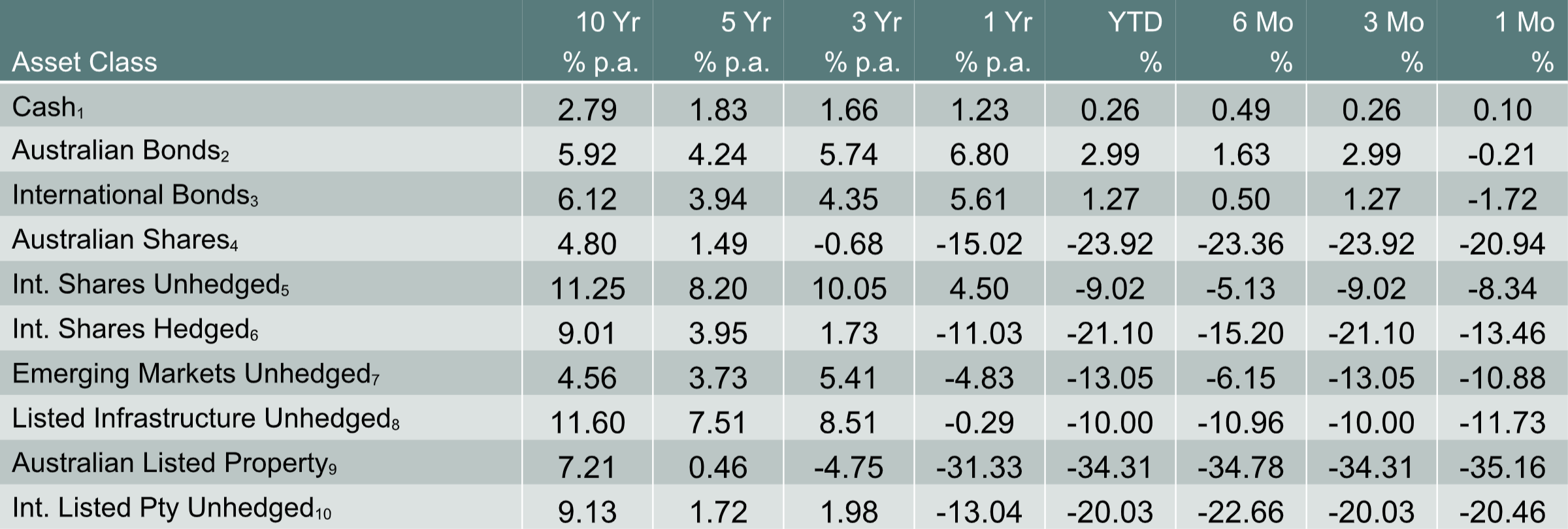
Monthly Market Review – March 2020
VIEW PDFHow the different asset classes have fared:
(As at 31 March 2020)

1 Bloomberg AusBond Bank 0+Y TR AUD, 2 Bloomberg AusBond Composite 0+Y TR AUD, 3 Bloomberg Barclays Global Aggregate TR Hdg AUD, 4 S&P/ASX All Ordinaries TR, 5 Vanguard International Shares Index, 6 Vanguard Intl Shares Index Hdg AUD TR, 7 Vanguard Emerging Markets Shares Index, 8 FTSE Developed Core Infrastructure 50/50 NR AUD, 9 S&P/ASX 300 AREIT TR, 10 FTSE EPRA/NAREIT Global REITs NR AUD
Financial markets were extremely volatile in March as investors grappled with immense uncertainty about the depth and the duration of the coronavirus’s impact on global growth. Share markets remained under intense pressure as the number of new coronavirus cases continued to surge and financial markets (particularly bond markets) experienced significant liquidity issues during the month. Governments around the world announced very large stimulus measures to support economic activity and central banks announced aggressive monetary easing to stabilise financial markets. While economic pain cannot be avoided in the near term, there are plenty of tools available to fight the economic slowdown in the longer term.
During this period of market volatility, it’s important to remember that financial markets have been through all sorts of crises and this is one from which the economy will eventually emerge. Long-term returns to share markets have historically been in the 7-9% per annum range for most markets around the world. However, these great returns come at the price of bouts of volatility every 10 or so years.
Cash and Fixed Income
Global government and corporate bond markets were highly volatile in March. Australian and international government bond yields initially plunged to historic lows, before rebounding sharply as investors sold positions across-the-board and bond markets became highly illiquid. The rebound higher in bond yields saw many central banks respond with aggressive monetary easing, including a combination of rate cuts, quantitative easing and liquidity injections aimed at restoring liquidity and proper market functioning to government bond and interest rate markets. The response by central banks was much faster and more aggressive than their response in 2008. As a result of the central bank action, government bond yields retraced lower towards the end of the month, with the 10-year Australian government bond yield finishing the month largely unchanged.
The Reserve Bank of Australia (RBA) was one of the central banks to announce a package of policy measures in March, including two 25 basis point rate cuts to a historic low of 0.25% and quantitative easing (QE). QE involves the RBA buying large quantities of longer-term securities such as government on the open market. The RBA bids in the market to buy the bonds and can in theory buy almost unlimited quantities of bonds because it does so with newly created bank reserves. Its effects are:
- If the RBA buys bonds and pays bondholders cash, the cash from the purchase of the bonds is deposited in the banking system resulting in banks being kept liquid in stressed environments. They have a lot of cash on hand that they can lend if need be.
- When the RBA buys bonds, they tend to push down long-term interest rates, which may stimulate the economy. It also tends to weaken the currency because you get lower interest rates when investing in Australia.
Therefore, QE is designed to provide both liquidity and stimulus to the economy in stressed times.
Corporate bond markets were also extremely volatile in March. Credit spreads widened substantially, particularly for high-yield bonds, but also for investment-grade bonds. This increases funding costs for corporations. Due to poor liquidity conditions in corporate bond markets, central banks announced a raft of liquidity measures. In particular, the US Federal Reserve stated that they would start purchasing investment-grade corporate bonds in the secondary market (i.e. bonds currently held by banks and funds). This was a crucial step in improving credit market liquidity and as a result corporate bond spreads retraced modestly lower towards the end of the month, but they remain very elevated.
Australian Shares
The Australian share market plunged by 21% in March due to the very major impact of the coronavirus on the economy and the financial system. As a result of the surge in new coronavirus cases across the globe, countries restricted the movement of people across borders and implemented social distancing measures. The falls in equity prices were broadly based across sectors, although the energy and tourism sectors fell particularly sharply. The equity prices of banks also fell significantly. Equity prices did stage a partial recovery late in the month after governments around the world, including Australia, announced large stimulus packages. At the end of the month, the Australian Treasury announced the single biggest post-war fiscal measure in Australia – a A$130bn JobKeeper Payment to business to keep their staff. The JobKeeper Payment is worth 6.5% of GDP and takes the combined fiscal stimulus measures by the Australian government to around 11% of GDP.
International Shares
International share markets (hedged) fell sharply by 13% in March due to ongoing concerns about the impact of the coronavirus on global growth. However, unhedged international shares were partly cushioned by a depreciation in the Australian dollar, falling by 8%. The declines in equity prices were broad-based, although some sectors were hit harder than others. Banks fell sharply. Sectors like oil and gas and basic resources were also hit hard, followed closely by a range of consumer-related sectors like tourism and leisure, auto, transport and travel, retail, food and beverages, and electronics.
The Australian Dollar
The Australian dollar finished the month roughly 5% lower due to negative risk sentiment, but it also experienced sharp swings over the month like other financial markets – dropping to 55.11c at one stage (the lowest level since 2002) before rebounding to around 61c at the end of the month.
Disclaimer: The information contained in this material is current as at date of publication unless otherwise specified and is provided by ClearView Financial Advice Pty Ltd ABN 89 133 593 012, AFS Licence No. 331367 (ClearView) and Matrix Planning Solutions Limited ABN 45 087 470 200, AFS Licence No. 238 256 (Matrix). Any advice contained in this material is general advice only and has been prepared without taking account of any person’s objectives, financial situation or needs. Before acting on any needs. In preparing this material, ClearView and Matrix have relied on publicly available information and sources believed to be reliable. Except as otherwise stated, the information has not been independently verified by ClearView or Matrix. While due warranty is also not intended to be a complete statement or summary of the industry, markets, securities or developments referred to in the material. Any opinions expressed in this material, including as to future matters, may be subject to change. Opinions as to future matters are predictive in nature and may be affected by inaccurate assumptions or by known or unknown risks and uncertainties and may differ materially from results ultimately achieved. Past performance is not an indicator of future

